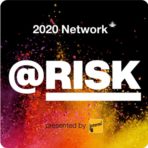Last Updated: October 6, 2020
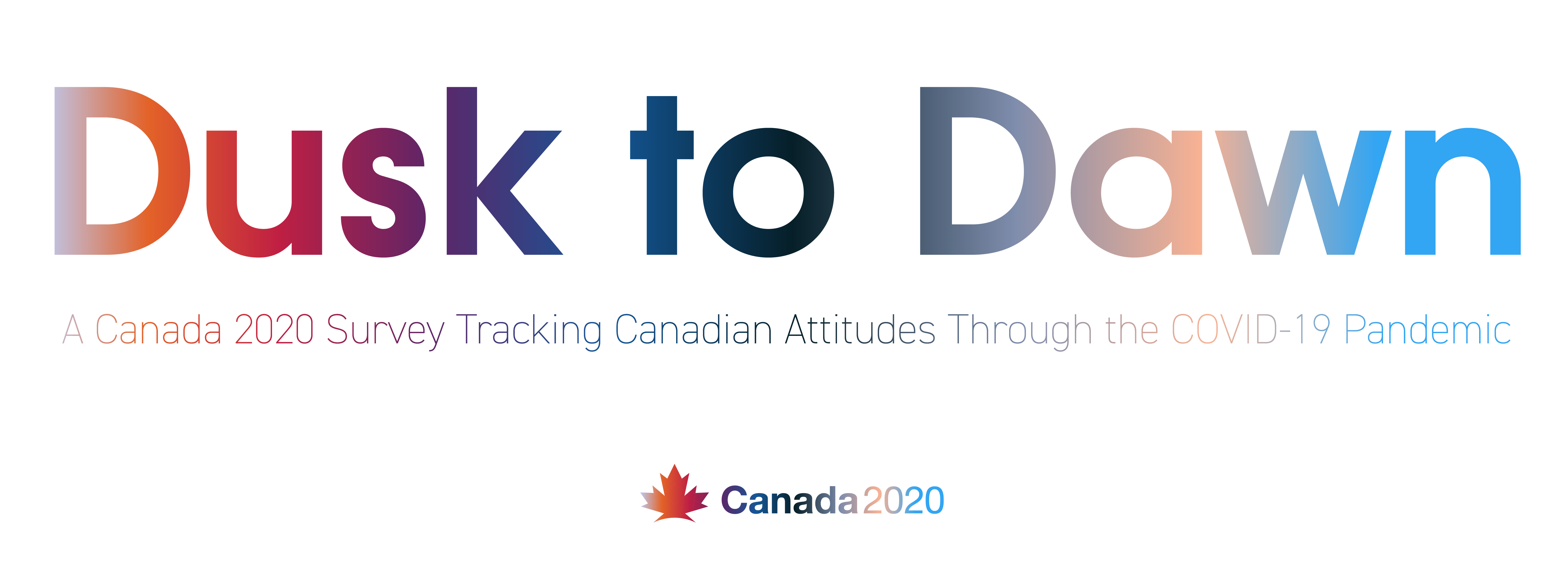
We are in the middle of the night.
That is the message Canadians are sending as a second wave of the coronavirus pandemic takes shape across our country.
This and other new findings are published in a new survey released by Canada 2020, Dusk to Dawn: Tracking Canadian Attitudes Towards the COVID-19 Pandemic.
Seven months ago, as the first cases of the SARS-CoV-2 virus were reported and Canadians went into lockdown, the vast majority of the population were experiencing a health pandemic for the first time in their lives.
Now, after a hard and isolating spring, and a summer attempting a tense normalcy, case numbers are sharply on the rise in Canada’s four largest provinces, and current public health measures have been unable to stop the virus from finding a home in each province and territory.
That is why, as a second wave hits, and seven months of anxiety, frustration and confusion crest along with it, Canada 2020 and our research partners at Data Sciences wanted to gauge how Canadians are feeling: where they think we are in the pandemic, what their priorities are both now and into the future, and how they feel we can best find our way through the night.
The survey, as a snapshot in time, is revealing in its uncertainty: it tells us that Canadians are anxious, that they are unsure about the future, and that our leaders will bear a tremendous responsibility – more than they have already shouldered – in uniting a fractured public through the worst of this crisis.
To better understand how these attitudes may evolve and change both in response to the virus and the action of our governments, Canada 2020 will be updating this survey three more times throughout the remainder of the year.
Our goal is to track these attitudes over time – both validating how Canadians are feeling as we move through a second wave, but also mapping their priorities, opinions and feedback onto better policy responses.
Alex Paterson
Executive Director
Canada 2020
Summary of Findings
Current Canadian sentiment is marked by a significant level of anxiety about the future and about the pandemic. While half the country is cautiously optimistic about the future or believes that we are through the worst of the pandemic, the other half still fear the worst is yet to come. As a reflection of this tension, most Canadians are, at best, lukewarm on the idea of wide sweeping reforms or are unsure of exactly what kind of solutions they want from government right now.
Right now, Canada wants Canadians to come first and for our national interests and values to be put at the forefront of recovery efforts. Broad support for seemingly contradictory policy objectives, and broad uncertainty point to a need for leadership at this moment in Canadian history. Canadians are looking for the way forward, and are not sure themselves what the future will or should hold.
As we move further towards recovery though, there will be greater need for leaders to demonstrate capacity for innovation to maintain the country’s confidence, and to develop novel solutions to challenges that have been exacerbated by the pandemic. There is a general feeling that we must move forward and cannot go back; it will be up to leaders to identify the best of ourselves that we can and should take with us into the future.
Methodology
The online survey engaged a sample of 1,585 Canadians from September 9th to 13th, 2020. The sample was balanced by gender, age group and regions in Canada. Our results are weighted by age, gender and region to be highly representative of the Canadian population. The margin of error for the data presented below would be ±2%, 19 times of 20 for a probabilistic sample of the same size.
Key Results
Where are we in the night?

Opinions may differ on where we are in the pandemic crisis. Nearer to the start or the end? To measure these differences of opinions we gave respondents a landscape picture divided into different slices, each representing a certain period of time from dusk to dawn. Canadians were then asked the following question:
“Please look at the picture, which is meant to represent the COVID-19 pandemic. Dusk is the beginning of the pandemic, midnight is the worst part of the crisis and dawn is recovery from the crisis. In your opinion, where is Canada right now?”
Few Canadians feel that we are in recovery mode already – only 11% chose early or full dawn. Consistent with this, 11% also agreed or strongly agreed that the Covid-19 pandemic was being blown out of proportion. 1 in 9 Canadians think things are fine, the rest do not.
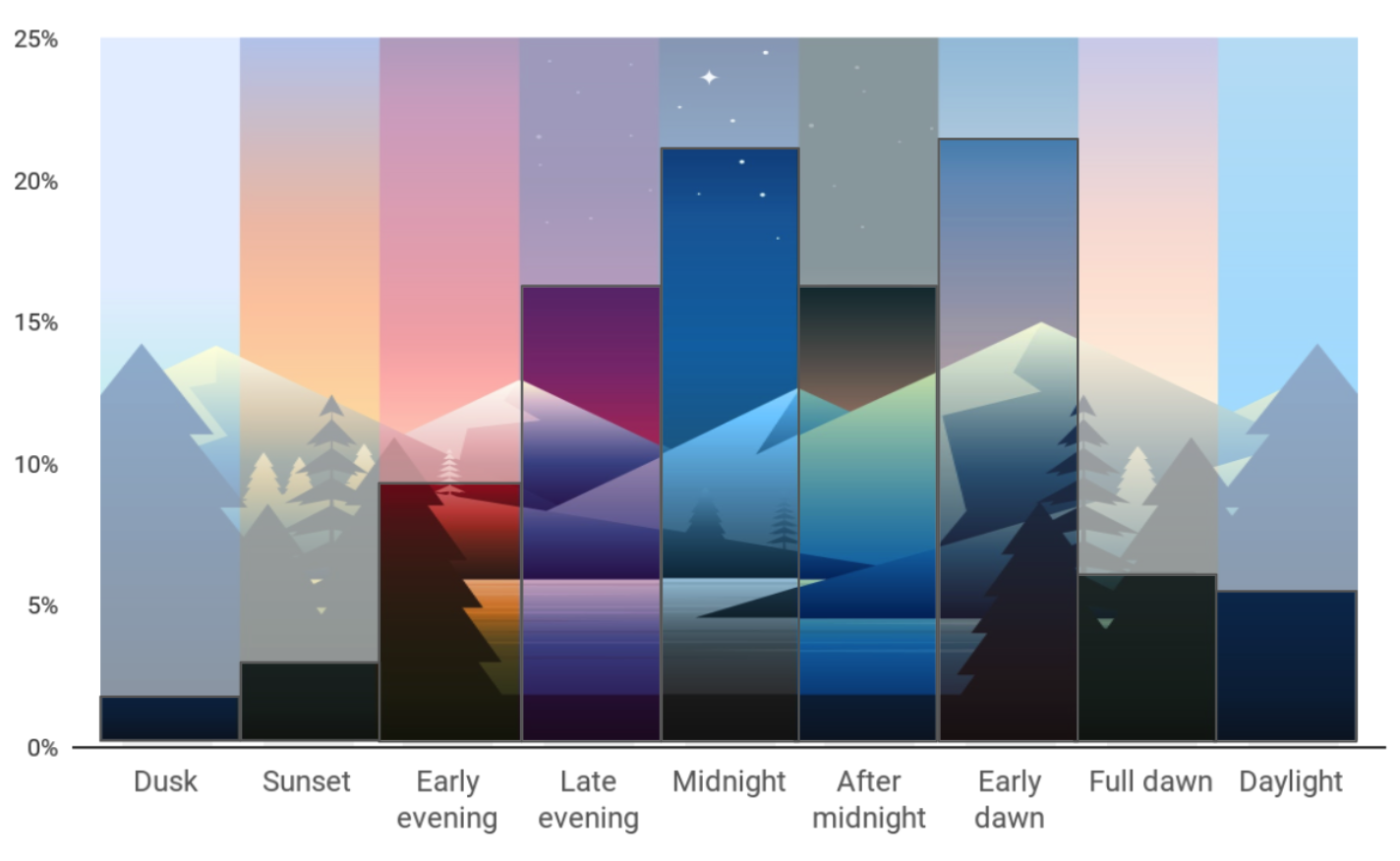
Otherwise, most Canadians (53%) feel that we are still in the darkest parts of the night. While a little over a third (36%) felt that we had turned a corner or entered the early dawn of this pandemic. As the cases begin to rise again, one wonders if the optimists will perhaps reconsider.
Part of the divide between those who feel we are facing the worst of the crisis now versus those who believe we are well on the road to recovery may be economic. Canadians who described themselves as financially stable were 20% more likely to have said that we are ‘past midnight’ than Canadians who say they are struggling financially.
Living within the pandemic
We also tested more specific sentiments about COVID-19 that add colour to our results presented above.
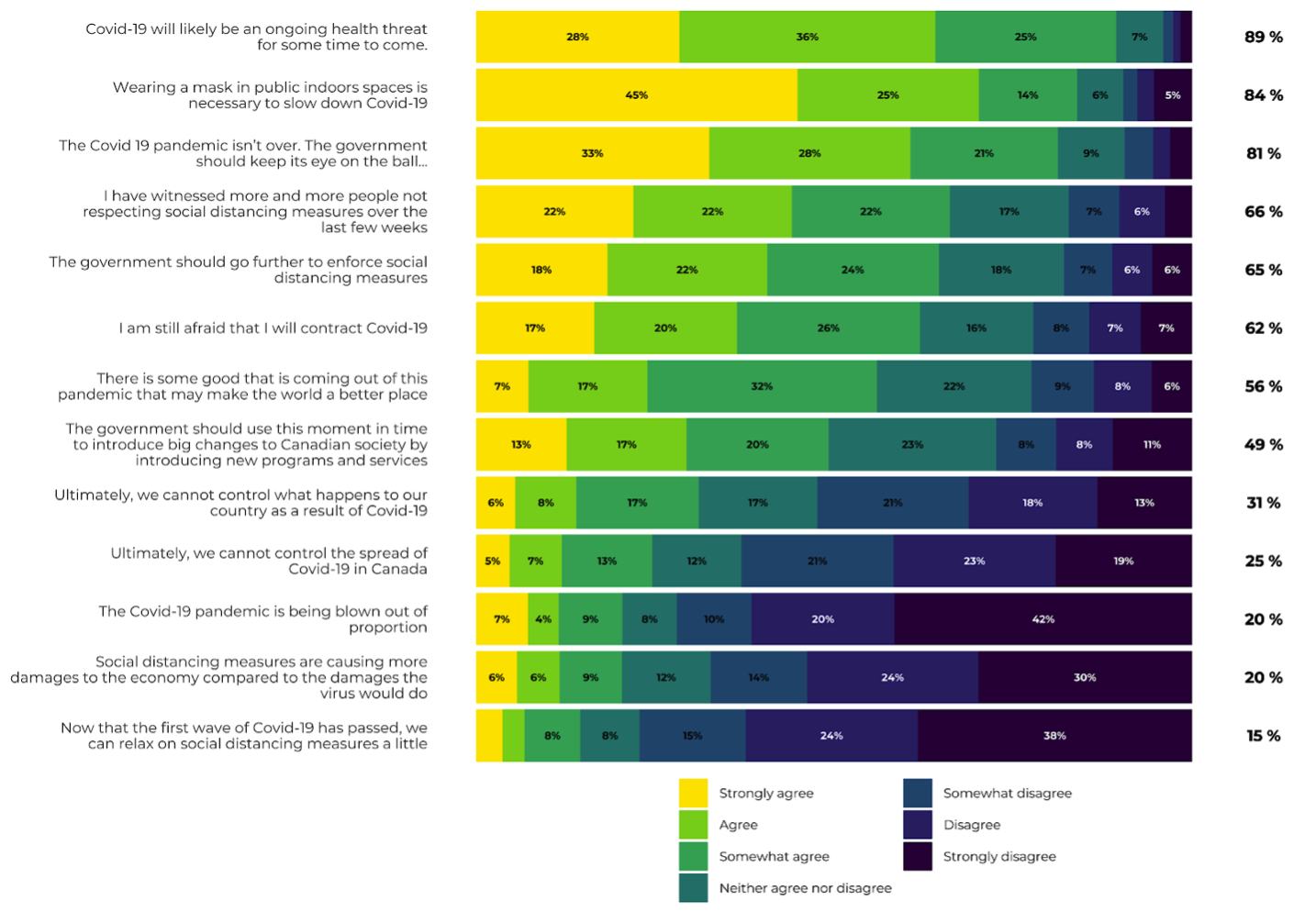
When we asked Canadians whether or not the pandemic was being blown out of proportion, 42% strongly disagreed and 20% disagreed. Only 11% strongly agreed or agreed.
Moreover, 37% agreed or strongly agreed that they are still afraid they would contract COVID-19 (and 26% somewhat agreed).
Very few seem to believe that social distancing measures are causing more damages to the economy compared to the damages that the virus would do (30% strongly disagreed that that is the case, and 24% disagreed; only 6% strongly agreed and 6% agreed).
45% strongly agree that wearing a mask in public indoors spaces is necessary to slow down COVID-19, and 25% agreed that that was the case.
In sum, our results show a population continuing to grapple a high degree of anxiety around the spread of COVID-19. Canadians are taking it – and the public health measures used to contain it – very seriously.
What is the best way through the woods?
We then asked respondents a series of questions meant to measure where they think leaders should put their focus now. From their responses, it was clear that there are two sentiments Canadians can widely agree on: It’s time to put Canada First and we need to take care of Canadians.
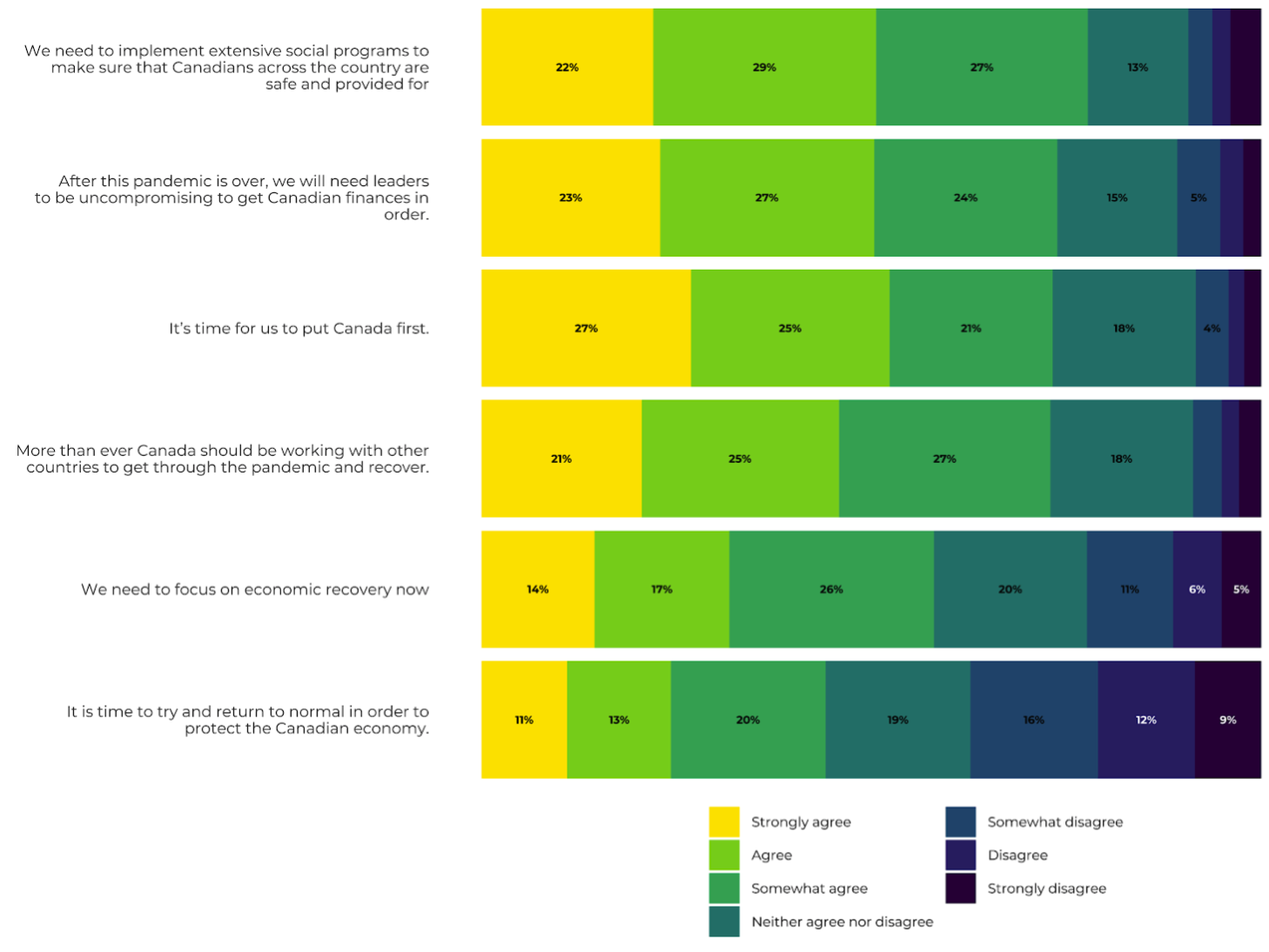
However, Canadians are split on what “taking care of Canadians” looks like practically speaking. Given that nearly half the country believes that we are through the worst of the crisis, it is not surprising that 24% would agree or strongly agree that it’s time to return to normal to protect the economy, and 31% would say that we need to focus on an economic recovery. However, others strongly disagree or disagree that now is the time to focus on the economy, and the vast majority find themselves in the middle on this issue.
The issues of uncertainty
We asked a series of questions to understand whether Canadians want wide-sweeping changes, austerity, or something in between. Our results mostly indicate that Canadians either are not sure what they want from the government right now.
On questions regarding big changes to Canadian society, most Canadians have mixed feelings:
- Q: “The government should use this moment in time to introduce big changes to Canadian society by introducing new programs and services”
- 25% agree or strongly agree, 60% in the middle, 13% disagree or strongly disagree
- Q: “Governments should not take on big reforms that were not in their campaign platforms.”
- 18% agree or strongly agree, 70% in the middle, 12% disagree or strongly disagree
It is not surprising that in uncertain times, people are unsure of what they want, or at least not totally aware of what they want.
What novel initiatives should leaders put forward?
We asked respondents about their support for a number of issues, as well as potential and existing government initiatives. Results were quite mixed.
On the one hand, Canadians understand that current spending levels seem unsustainable. An overwhelming majority are concerned about the deficit (42% Very concerned, 39% somewhat concerned). They also overwhelmingly agree that after this pandemic is over, we will need leaders to be uncompromising to get Canadian finances in order (50% agree or strongly agree, 24% somewhat agree).
On the other hand, when presented with new options for spending programs Canadians were supportive of every initiative they were asked about. They also agreed that we need to implement extensive social programs to make sure that Canadians across the country are safe and provided for (51% agree or strongly agree, 27% somewhat agree). Supporting local producers and manufacturers with a new “Shop Canadian” label, police reforms, a new deal on jobs, and caregiver support were the most popular.
When it came to working with other countries, or a Canada first policy results were similarly ambiguous: about three quarters of Canadians support both of these contradictory viewpoints.
Taken together with the above, these contradictory findings suggest Canadians aren’t sure what they want exactly. But they would be happiest to keep money close to home, support their community and to not have to pick up the cheque for the pandemic if at all possible. Long held attitudes towards international multilateralism may also be newly vulnerable to a more populist and nationalistic message.
Unity and togetherness are our best bet
Across our findings, Canadians are communicating a desire for unity and togetherness both throughout and in response to this crisis.
54% of respondents reported seeing more mutual support within their communities than before the pandemic.
Along the same lines, 56% of respondents believe that there is some good that is coming out of the pandemic that will make the world a better place.
This slice of compassion and sense of community underpins a few policy priorities – particularly in the realm of social policy – with an overwhelming 78% of respondents believing that our government will need to implement extensive social programs to make sure Canadians across the country are safe and supported.
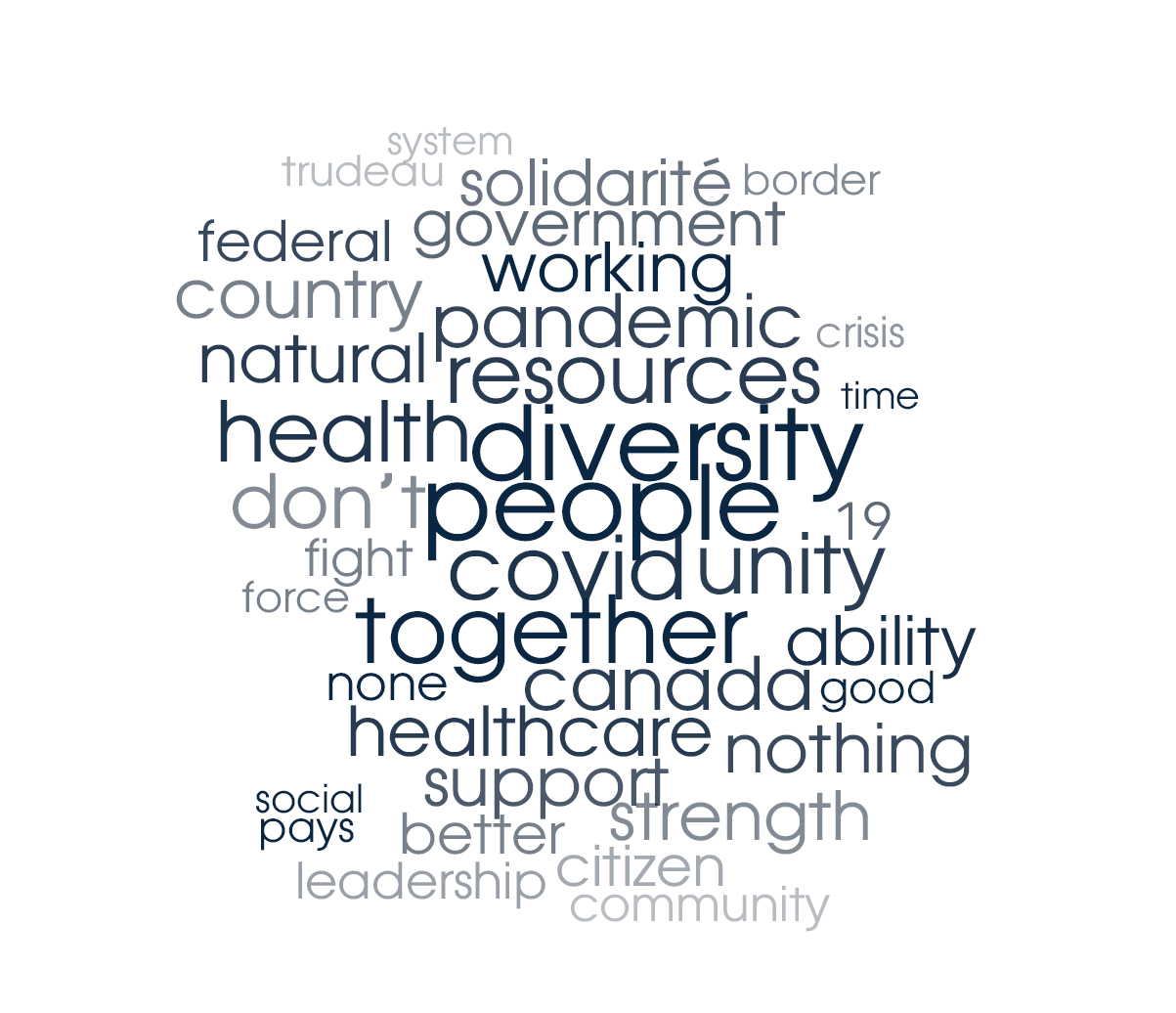
Indeed, when asked what in their opinion is Canada’s greatest strength right now, respondents reported – unprompted – variants on the theme of togetherness: unity, working together, being strong together, community, compassion for each other, and solidarity.
Those attributes, bolstered and supported by strong leadership and coordination by our officials, points the way forward as we face a second wave of this crisis.
Questions? Feedback? Get in touch at info[at]canada2020.ca.



